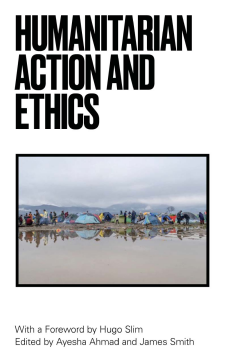
Additional Information
Book Details
Abstract
From natural disaster areas to conflict zones, humanitarian workers today find themselves operating in diverse and difficult environments. While humanitarian work has always presented unique ethical challenges, such efforts are now further complicated by the impact of globalization, the escalating refugee crisis, and mounting criticisms of established humanitarian practice.
Featuring contributions from humanitarian practitioners, health professionals, and social and political scientists, this book explores the question of ethics in modern humanitarian work, drawing on the lived experience of humanitarian workers themselves. Its essential case studies cover humanitarian work in countries ranging from Haiti and South Sudan to Syria and Iraq, and address issues such as gender based violence, migration, and the growing phenomenon of ‘volunteer tourism’. Together, these contributions offer new perspectives on humanitarian ethics, as well as insight into how such ethical considerations might inform more effective approaches to humanitarian work.
‘Ahmad and Smith expertly dissect the moral and ethical dilemmas inherent in the delivery of humanitarian assistance, helping aid workers develop the practical approaches needed for effective responses.’
Unni Karunakara, Yale School of Public Health, and former International President of MSF
‘Brings fresh thinking to the field of practical ethics in aid, and helps to bridge the divide between academics and practitioners. It will help field teams with the practical problems that they face in delivering change within today’s highly politicized aid environments.’
Neal Keny-Guyer, CEO, Mercy Corps
‘Remarkably interdisciplinary, deeply thought-provoking, and relentlessly practical, Humanitarian Action and Ethics will be instructive to scholars, practitioners and the interested public alike.’
Janina Dill, University of Oxford
‘An important and valuable book on the ethical challenges arising in humanitarian action. It highlights the complex range of challenges, while also presenting practical and constructive recommendations from authors who have worked on the front line of humanitarian crises.’
Bayard Roberts, London School of Hygiene and Tropical Medicine
‘Powerfully depicts the ethical challenges pervading a world which deliberately generates so much human suffering through disasters and conflict. The chapters demonstrate what we can do to help, despite the moral entanglements of today's humanitarian labyrinth.’
Ilan Kelman, Institute for Risk & Disaster Reduction, University College London
'Nobody is under the illusion that humanitarian work is easy or convenient. What Ayesha Ahmad and James Smith have achieved in this volume, moreover, is a powerful challenge to the idea that it is unquestionably "right".'
Encylopedia Geopolitica
Dr Ayesha Ahmad is a lecturer in Medical Ethics and Law at St George's University of London, and Honorary Lecturer at the Institute for Global Health, University College London. She specialises in gender-based violence and mental health in conflict and humanitarian crises.
James Smith is a Research Fellow with the Health in Humanitarian Crises Centre at the London School of Hygiene & Tropical Medicine (LSHTM). He has worked as a researcher with Médecins Sans Frontières’s Research Unit on Humanitarian Stakes and Practices (UREPH), and as a clinician with the U.K. National Health Service.
Table of Contents
| Section Title | Page | Action | Price |
|---|---|---|---|
| Cover | Cover | ||
| Praise for the book | i | ||
| About the Editors | ii | ||
| Title page | iii | ||
| Copyright page | iv | ||
| Dedication | v | ||
| Contents | vii | ||
| Acknowledgements | x | ||
| Contributor Biographies | xi | ||
| Foreword: Humanitarian Action and Ethics | xx | ||
| Foreword: On the Front Lines of Humanitarian Medical Ethics | xxii | ||
| Introduction: Narrating Humanitarian Action and Ethics | 1 | ||
| 1. Difficult Decision-making, Compromise, and Moral Distress in Medical Humanitarian Response | 6 | ||
| 2. Moral Entanglement and the Ethics of Closing Humanitarian Projects | 22 | ||
| 3. The Outsider’s Role: Ethical Reflections from the Study of International–National Staff Relations in Development and Humanitarian Organisations | 40 | ||
| 4. The Moral Motivation of Humanitarian Actors | 62 | ||
| 5. Makeshift Humanitarians: Informal Humanitarian Aid Across European Close(d) Borders | 79 | ||
| 6. Amateur Humanitarianism, Social Solidarity and ‘Volunteer Tourism’ in the EU Refugee ‘Crisis’ | 94 | ||
| 7. La Nouvelle France: Institutionalised Abuse, ‘Exception’ and Spectacle in the Exiled/Volunteer Relationship at the Franco–British Border | 112 | ||
| 8. Ethical Challenges Among Humanitarian Organisations: Insights from the Response to the Syrian Conflict | 133 | ||
| 9. Home and Away: Ethical Issues in Humanitarian Aid to Syrians in Israel | 146 | ||
| 10. The Emergence of Humanitarian Failure: The Case of Haiti | 160 | ||
| 11. Ethical Encounters as a Humanitarian Psychiatrist | 181 | ||
| 12. One for All, or All for One: The Ethical Implications of Individual Human Rights-based and Public Good-based Frameworks in Emergency Mental Health | 200 | ||
| 13. Ethics of Cultural Concepts and Conflicts Surrounding Disclosure of Gender-based Violence in Humanitarian Settings | 219 | ||
| 14. The Invisible Man: The Shrouding of Ethical Issues Related to Sexual Violence Against Men in the Humanitarian Response in the Democratic Republic of Congo | 232 | ||
| 15. Humanitarian Ethics in Médecins Sans Frontières/ Doctors Without Borders: Discussing Dilemmas and Mitigating Moral Distress | 249 | ||
| 16. Stop Missing the Point: Managing Humanitarian Action Well | 269 | ||
| 17. An Ethic of Refusal: The Political Economy of Humanitarianism Under Neoliberal Globalisation | 283 | ||
| Afterword: The Ethics of Compiling a Book on Humanitarian Ethics | 308 | ||
| About Zed | 312 |
